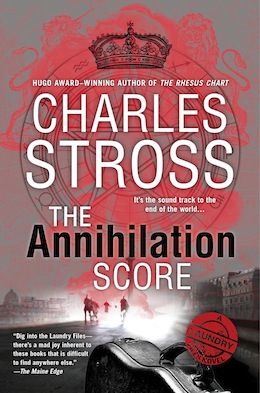The Annihilation Score is the sixth installment of Charles Stross’s “Laundry Files” series. And, for a change of pace that I found delightful, the narrator this time around isn’t Bob Howard: this story is Mo’s, and it picks up exactly where The Rhesus Chart left off.
The gist of the problem is that due to the confluence that is the beginning of Case Nightmare Green, regular humans have started cropping up with talents that they perceive to be superpowers. Mo, as a representative of the Laundry, has to find some way of managing this suddenly very public appearance of the paranormal. She’s also dealing with the increasingly unpleasant task of being the holder of the Eric Zahn original violin she calls Lecter—one cause for the separation that means Bob is more or less entirely out of the picture in this book.
It’s no large secret that I am a fan of this series—I’ve reviewed the last two books here (The Rhesus Chart and The Apocalypse Codex) and thoroughly enjoyed them both. As far as long-running series that I’m currently invested in go, this is the one I’d vote “smartest” and “most entertaining.” The Annihilation Score keeps up that pace and adds a certain depth and breadth of perspective that comes from Mo’s personal experience as a field agent, a middle-aged woman, and a person who’s been suddenly dumped into an upper management position. I thought it was a solid change-up.
So, last time around, I was pleasantly surprised at how fresh Stross managed to make a book about vampires. This time, I had my misgivings, because I’m going to be honest: I cannot stand most books about superheroes. Suffice to say that I was wrong to have had even a smidgen of doubt. The Annihilation Score is sharp, fresh, and sufficiently tongue-in-cheek about the whole possibility of people mistaking themselves for superheroes to make it a very enjoyable venture. It’s also sufficiently dark, since it turns out that using those “superpowers” is not unlike using ritual magic in one’s head: it can invite in extradimensional parasites, and therefore lead to K-syndrome.
Nothing is user-friendly during the apocalypse, obviously.
As for the plot, I thought I could see where it was going for most of the book—but in the end, it was actually heading at an off-angle to that course. Pleasant surprise, and very effective narratively. It’s also the usual amount of realistically bureaucratic: on the one hand we have an actual superhero outbreak; on the other, we have organizational charts, management presentations to the Home Secretary, and a lot of conferences. Mo’s handling of being thrown out to the wider world as the head of a division that doesn’t technically exist yet is smart and embedded more thoroughly in office political dramas than urban fantasy or action stories. And yet, Stross links those two things seamlessly.
The individual plot of the book also builds well into the larger world of the Laundry Files, developing further issues like the violin, Lecter. The fact that Mo has been, in some senses, an assassin for the Laundry is an undercurrent in other books—we see her experiences from Bob’s perspective as her husband, the person she comes home to with her nightmares and trauma. While we’ve been reading along with Bob’s rise through the ranks of the Laundry to finally, at this juncture, take over Angleton’s role, Mo has also been undergoing her own changes and evolution as an operator in the field. And, in The Annihilation Score, that comes to a head: Lecter has become a very real problem, as has her long-term assignment to wield him in terrible places doing terrible things.
 I actually found the complex, manipulative, rather awful relationship between violin and handler to be well done—because the sexual component that’s a large part of that power-struggle could be handled poorly. Instead, it’s clear that part of the reason Lecter attempts to manipulate Mo in the ways that it does is because of the expectations of patriarchal society and how they shape women and men’s interactions. And, ultimately, Mo is the one who asserts control over the situation and makes it clear that no-means-no.
I actually found the complex, manipulative, rather awful relationship between violin and handler to be well done—because the sexual component that’s a large part of that power-struggle could be handled poorly. Instead, it’s clear that part of the reason Lecter attempts to manipulate Mo in the ways that it does is because of the expectations of patriarchal society and how they shape women and men’s interactions. And, ultimately, Mo is the one who asserts control over the situation and makes it clear that no-means-no.
Which makes sense, because overall, this time around it really is all about Mo. Bob as a narrator has a certain tone and style; it’s often about that a-bit-nerdy, sometimes- feckless white boy charm. He’s smart and honest and sincere, and he’s good at telling stories for the record, but he’s also sometimes clueless and perhaps isn’t the best at his romantic relationships. The fact that his wife is 100% aware of all that and finds it at turns charming and frustrating is a thing that makes me like her as a narrator pretty much immediately. Seeing Bob through her eyes is like seeing a different Bob, one that I think adds nuance to my understanding of his narrative version of things.
Mo, on the other hand, is in some ways more mature. She’s been divorced before, has been through this song-and-dance, and loves her husband but isn’t sure that the pair of them can actually make it work. But she keeps her wild-oats-sowing to a minimum and does it smartly; I like that though the subplot with Jim is semi-romantic in nature, Mo has a firm hand on what she does and why she’s doing it.
I’d also like to point out that while I felt a little “hrm” about the initial re-introduction of Ramona and Mhari, for sake of ease to be thought of as Bob’s exes, I loved where the novel actually went with it. While at first Mo is jealous—and very aware of her jealousy—the other two women become her strongest supporters, her friends, and her rescuers in the end. This is, in a lot of ways, a book about Mo forming a support net with other women as friends and coworkers; it deals with getting past the ingrained responses of jealousy and competition to have relationships that can be vital and productive. So, honestly, that was kind of awesome in and of itself as a background thread.
The Annihilation Score, when it comes down to it, might be the book in the series I like best so far in some ways. I loved seeing Mo’s take on the world, as well as her relationship with Bob; it’s so unexpected in a series to switch from a male protagonist to a female protagonist—who’s married to him, no less—and treat her as equally or more of a badass, well-rounded, competent and fascinating human being. (It’s almost like we’re all people! One of the many, many reasons I enjoy Stross’s work.) I also almost crowed with delight at the last few pages, because it’s nice to see her career path also taking a different but no-less-awesome direction than Bob’s. And, well, I’d like to see how things work out between them—if they do work out, over the next few books.
In short: thumbs up for a smart and engaging novel that continues a very smart and engaging series. Highly recommended, still.
The Annihilation Score is available July 7th from Penguin Books.
Read an excerpt from the novel here on Tor.com.
Lee Mandelo is a writer, critic, and editor whose primary fields of interest are speculative fiction and queer literature, especially when the two coincide. She can be found on Twitter or her website.










